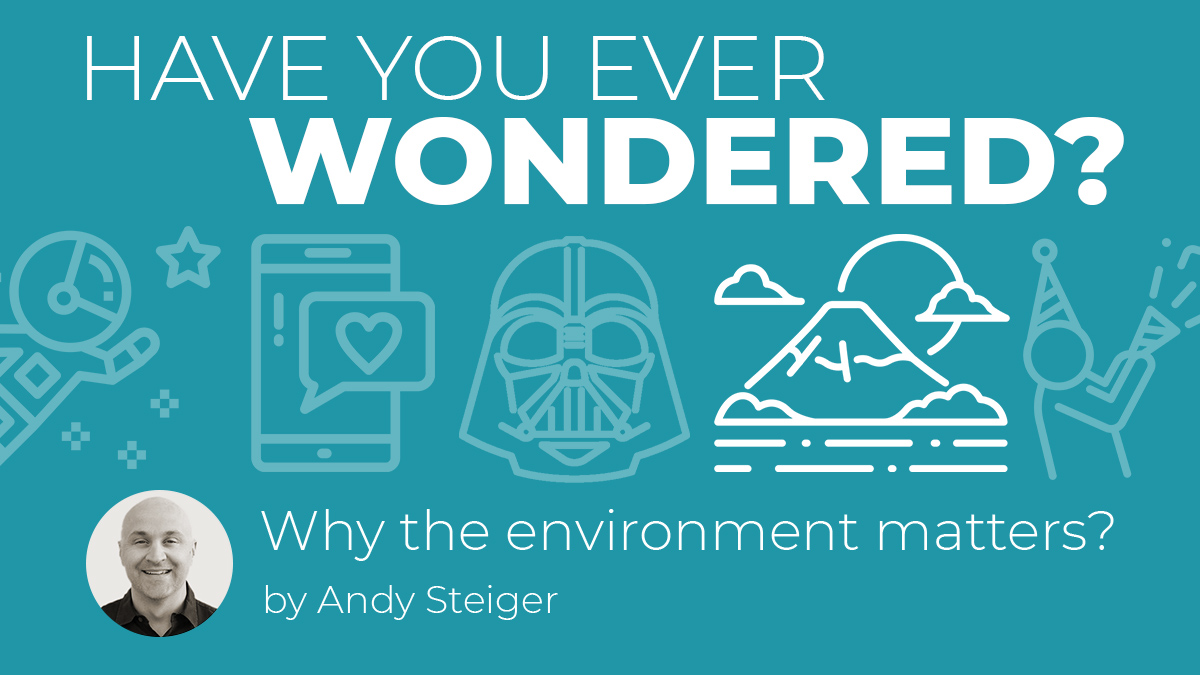“Do you care about the environment?” This has become a defining question of the 21st century, one that we find ourselves continually answering indirectly in the daily decisions of our lives. I was once asked this question directly. As I walked out of a bookstore, I was greeted on the street corner by a friendly college student wearing a Greenpeace t-shirt and holding a clipboard. He was delighted to hear that I did care about the environment. He explained to me how people are destroying the planet but that I could do something about it by making a donation. Before I opened my wallet to support this global cause, I wanted to pursue the question deeper. With genuine interest, I asked: “Why should I care about the environment?” It was obvious from his silence and blank stare that I had identified something of a cultural blind spot. After pondering my question for a while, he responded: “We should care about the environment for future generations.”
The answers “future generations” or “world heritage” seem to capture the most common responses I hear from those questioned with why they reduce, reuse, and recycle. These are good answers but notice that the logic is established in the value of people not nature. Intuitively we understand that we don’t owe a rock anything, even one the size of a planet. This is because one’s moral duty is owed to persons not things. It’s why we walk on rocks and not people.
Unfortunately, people have taken our moral duty to protect the environment to an extreme.
For example, both New Zealand and Canada have each granted legal personhood status to a river (Whanganui River and Magpie River). Before this, New Zealand began this legal precedence by giving personhood status to a forested hill country called Te Urewera, that technically owns itself. These legal moves grant these rivers and land the same value and rights as a human person. Although I appreciate this was done to protect the environment, it undermines its own project by calling into question the value of future generations.
We must remember that after WWII the Universal Declaration of Human Rights was created to stop people from ever being devalued again. That document begins with the famous declaration that all humans have inherent dignity. Inherent means that our value is encountered not created. That is, we come into the world with value. No human gave it to us, and thus cannot legitimately take it away. Our desire to protect the environment for future generations gives voice to that shared dignity we encounter in each other. However, when a government gives our value to an object or an animal—it cheapens, and even undermines our own dignity; it is the very definition of dehumanizing. Similar to poor environmental stewardship, future generations will pay for the mismanagement of our human value.
We should be concerned about policies that undermine the value of future generations, but we should ask if the environment matters without us? Here again, we run into the problem that things only matter or have value in relationship to a person or persons. Without persons the environment presents a very depressing perspective. This is where modern philosophy continues to undermine environmentalism. For example, the chair of the philosophy department at Duke University, Alex Rosenberg succinctly summarizes the foundation of modern thinking: “The physical facts fix all the facts.”[1] This seems to sum up the secular perspective and leads philosophers, such as Rosenberg, to the following conclusions: “What is the nature of reality? What physics says it is. What is the purpose of the universe? There is none. What is the meaning of life? Ditto.”[2]
I expressed my concern over this physics-only worldview with the man from Greenpeace by asking: “Why bother caring for the environment or future generations?” He looked perplexed, so I offered an explanation: “Physics tells me that the sun is dying and as it does it will expand until the earth is consumed in fire. If my life and the planet are destined for destruction and are ultimately meaningless, I might as well get what I can while I can.” With a mix of profanities, he said, “That’s messed up.” “I agree.” I told him, “but why?”
I find it odd that so many universities today teach that the physical facts fix all the facts and yet you should still recycle. However, that is not a physical fact. What do I owe a meaningless universe? Nothing! Yet, that is surely wrong and justifies this man’s revulsion. What’s the alternative? Rethinking our worldview. Perhaps we know the environment matters with or without us because our planet exists in relationship to another person—God. My answer to why the environment and future generations matter is because God matters. As a Christian, my responsibility to the environment and future generations is grounded in my relationship to God, which also give life and the universe meaning, purpose, and value. If you care about the environment and future generations, I encourage you to invite the person of God into your thinking.
Dr Andy Steiger is the author of ‘Reclaimed’ which can be found here.
[1] Alex Rosenberg, The Atheist’s Guide to Reality: Enjoying Life Without Illusions (New York: W.W. Norton Company, 2011), 162.
[2] Rosenberg, The Atheist’s Guide to Reality, 2-3.


